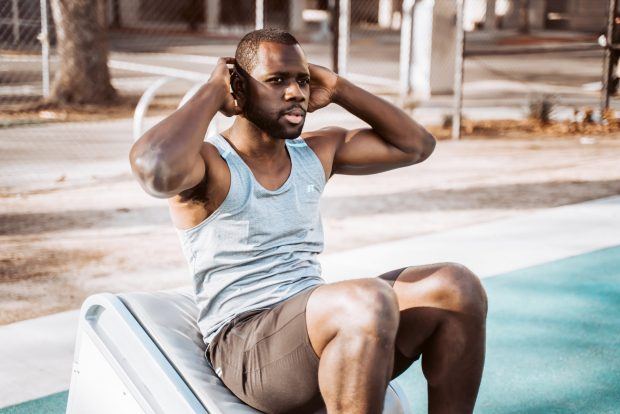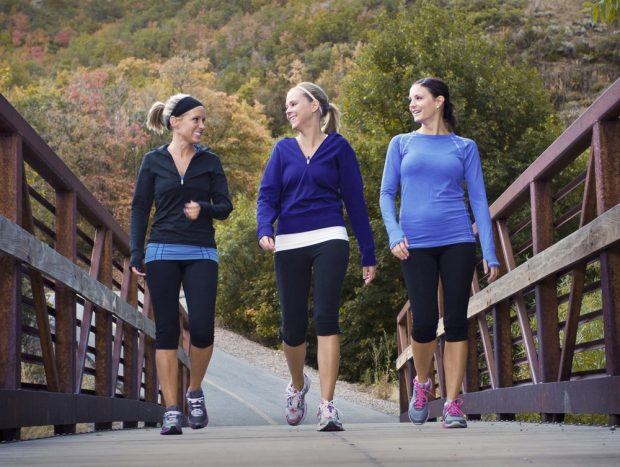It’s true that many people just don’t like to take regular exercise. It’s too much effort, not much fun and easier just to laze around. However, countless scientific studies confirm that when you exercise regularly, the health benefits are very significant and should not be overlooked. Regular physical movement has been proven to reduce your risk of heart disease, stroke, type 2 diabetes, breast and colon cancer and even help you manage depression, so get off your couch and get moving.
This is How Exercise Protects Your Health
The science on the benefits of exercise is extensive. One study by Harvard scientists discovered that when you exercise, your muscles release natural substances that help relax blood vessel walls, lower blood pressure and reduce “bad” LDL cholesterol. Physical activity will increase “good” HDL cholesterol and move glucose out of the bloodstream and into the cells where it is needed, lower insulin levels, and reduce inflammation.
All of these functions together help protect us against heart disease, stroke, type 2 diabetes, and some cancers. There is also irrefutable evidence showing the beneficial effects of exercise both to prevent and to treat several other diseases.
Researchers have shown that both men and women who report increased levels of physical activity and fitness have reductions in relative risk of death (by about 20%–35%).

Why Exercise Helps You Lose Weight
Regular exercise can reduce abdominal adiposity (fat), improve weight control, and enhance lipoprotein profiles (e.g., reduce triglyceride levels, increase high-density lipoprotein and decrease low-density lipoprotein levels). Another study found that exercise will also improve glucose homeostasis and insulin sensitivity, reduce blood pressure, improve autonomic tone, reduce systemic inflammation; decreased blood coagulation, improve coronary blood flow, augment cardiac function and enhance endothelial function.
This is not a new phenomenon. Our early ancestors were reaping the benefits of regular activity. Of course, back then, movement happened more naturally, but still, the outcome cannot be overlooked.
Records have been found dating back to 2500 BC in ancient China which confirm that exercise was used to promote good health. In Greco-Roman times, 2500 years ago, Hippocrates (460–370 BC) and later Galen (AD 129–210) also recognized exercise’s role in health.
Exercise can have the same effect as taking a drug
Exercise may have the same effect as taking a psychoactive drug. This is really not a far-fetched idea. Scientists looked at molecular signaling pathways in the brain and found that exercise was so powerful it had the same effect as a psychoactive drug. Other researchers believe that in some cases exercise can be a treatment on its own.
Did you know that it has been found to reduce the symptoms of depression and anxiety?
Reduce depression by exercising
According to observational studies, greater amounts of occupational and leisure-time physical activity are generally associated with reduced symptoms of depression.

According to the Mayo Clinic, regular exercise may help ease depression and anxiety by:
- Releasing feel-good endorphins, natural cannabis-like brain chemicals (endogenous cannabinoids), and other natural brain chemicals that can enhance your sense of well-being
- Take your mind off worries so you can get away from the cycle of negative thoughts that feed depression and anxiety
Regular exercise has many psychological and emotional benefits, too. They can help you:
- Gain confidence. Meeting exercise goals or challenges, even small ones, can boost your self-confidence. Getting in shape can also make you feel better about your appearance.
- Get more social interaction. Exercise and physical activity may give you the chance to meet or socialize with others. Just exchanging a friendly smile or greeting as you walk around your neighborhood can help your mood.
- Cope in a healthy way. Doing something positive to manage depression or anxiety is a healthy coping strategy. Trying to feel better by drinking alcohol, dwelling on how you feel, or hoping depression or anxiety will go away on its own can lead to worsening symptoms.
Rock star Adele has transformed her mental health and body by exercising regularly.
 What kind of exercise is needed?
What kind of exercise is needed?
Other studies have shown post-meal walking helps regulate blood sugar levels; strengthens the body and flexibility. Exercise can reduce pain from hip and knee arthritis, and can improve the cognitive functioning of people with dementia.
Unfit people can get significant improvements in physical fitness with low training intensity, while those with a higher fitness level need a greater level of exercise intensity to achieve further improvements in fitness.
Exercise is good for your brain
Haven’t convinced you yet? Well, here are more reasons to get moving.
An April 2014 study in the British Journal of Sports Medicine found that regular aerobic exercise appears to boost the size of the hippocampus, the brain area involved in verbal memory and learning Voluntary exercise has been shown to provide pronounced relaxing effects on the majority of the population. It will also help you think clearer and be calmer in your decision-making. If you are hyperactive or you have a child who is hyperactive, then exercise is the best medicine to calm down and provide better focus.
Why is our psychological well-being so important for our hearts?
Exercise is also good for your heart. Studies show it’s particularly important for the prevention and management of heart disease. Physical activity results in specific adaptations that affect individual states in all of these diseases.
Recent research suggests that modest increments in energy expenditure due to physical activity (∼1000 kcal per week) or an increase in physical fitness of 1 MET (metabolic equivalent) is associated with lowering mortality by about 20%. That means you will live longer if you are active.
Research has proven that physically inactive middle-aged women (engaging in less than 1 h of exercise per week) experienced a 52% increase in all-cause mortality, a doubling of cardiovascular-related mortality, and a 29% increase in cancer-related mortality when compared with physically active ones.
There is clear evidence that regular physical activity produces significant health effects and reduces the risk of premature death from any cause and from cardiovascular disease in particular amongst asymptomatic men and women.
 Even if you are sick, exercise can be good for you
Even if you are sick, exercise can be good for you
Some may argue that if you have an underlying medical condition or are ill, the exercise would not be good for you. However, this is not always true.
Observational and randomized trials have shown that regular physical activity contributes to the treatment of several chronic diseases. There’s evidence for prescribing exercise in the primary and secondary prevention of pulmonary and cardiovascular diseases (CHD, chronic obstructive pulmonary disease, hypertension, intermittent claudication); metabolic disorders (type 2 diabetes, dyslipidemia, obesity, insulin resistance); muscle, bone, and joint diseases (rheumatoid arthritis, fibromyalgia, chronic fatigue syndrome, osteoporosis); cancer; and depression.
Importantly, if you have an underlying medical condition, you must seek professional advice on what exercise to do.
What kind of exercise is needed?
Unfit people can get significant improvements in physical fitness with low training intensity, while those with a higher fitness level need a greater level of exercise intensity to achieve further improvements in fitness.
Here’s how you can get active for better health
- Aim for half an hour of moderate physical activity most days of the week, or 150 minutes a week. If that seems daunting, then start with a few minutes a day and increase the amount you exercise by five or 10 minutes every week until you reach your goal.
- If you don’t want to walk, consider other moderate-intensity exercises. Swimming, stair climbing, tennis, or dancing are great alternatives. Don’t forget that household activities can count as well. Anything that gets your heart pumping so much that you break out in a light sweat will count.
- Join a class, or work out with a friend who’ll hold you accountable. Download an app and track your progress, which encourages you to reach a goal. Use a pedometer or a digital fitness monitor to count steps.
- And if you aren’t able to perform the moderate-intensity exercise, remember: even light activity can make a difference in your health.
 How much exercise should you do for longevity?
How much exercise should you do for longevity?
Dosage is important in clinical medicine and all marketed drugs require data on their efficacy and safety. It is known that there is a minimum amount of physical activity for health benefits. These benefits increase with increasing the amount of exercise, but beyond a certain level, adverse effects outweigh the benefits.
Unlike chemical drugs, however, the minimum dose, dose-response, and maximum safe dose of physical activity are not well understood. There is a continuous debate on how much, what type, how often, what intensity, and how lengthy physical activity should be.

Photo by Fortune Vieyra on Unsplash
Over the years, various expert groups have tried to work out different physical activity recommendations and guidelines (see Table 1).
Historical evolution in physical activity recommendations and guidelines
| Physical activity recommendations | ||||
| Intensity | Minutes | Frequency | Reference | |
| 1970s–1980s | Vigorous exercise (e.g. running) | 20 min·day−1 | 3 times·week−1 | (American College of Sports Medicine, 1978) |
| 1990s | Moderate exercise (e.g. brisk walking) | 30 min·day−1 | Most days of the week | (Pate et al., 1995; Physical activity and cardiovascular health, 1996) |
| 2000s | Moderate exercise | 60 min·day−1 | 3 times·week−1 | (Lee, 2007) |
| 2010 (healthy adults ages 18–45) | Moderate exercise | 30 min·day−1 (150 min week−1) | Most days of the week (5 days·week−1) | (O’Donovan et al., 2010) |
| Vigorous exercise | 75 min·week−1 | (O’Donovan et al., 2010) | ||
Of course, if you want to lose weight, then you will have to put in more effort.
In fact, for many individuals, up to 60 min of daily physical activity is more appropriate if weight control is the primary goal (Lee, 2007).
Dose-response relations between physical activity and different health outcomes are different. Researchers say “the evaluation of the minimum amount of physical activity (lower dose) necessary to achieve its beneficial effects has been the object of intense research.”
“Wen et al. (2011) have recently found that 15 min a day or 90 min a week of moderate-intensity exercise is of benefit in terms of life expectancy, even for subjects with cardiovascular risks.”
Bottom Line
Change your attitude towards exercise. Take your time, get off the couch, put down your digital device and get moving. Once you exercise regularly, you’ll never look back on good health and longevity.
References
-
Exercise acts as a drug; the pharmacological benefits of exercise
- American College of Sports Medicine. Position statement on the recommended quantity and quality of exercise for developing and maintaining fitness in healthy adults. Med Sci Sports Exerc. 1978;10:vii–x. [PubMed] [Google Scholar]
- Blair SN, Kohl HW, 3rd, Paffenbarger RS, Jr, Clark DG, Cooper KH, Gibbons LW. Physical fitness and all-cause mortality. A prospective study of healthy men and women. JAMA. 1989;262:2395–2401. [PubMed] [Google Scholar]
- Blair SN, LaMonte MJ, Nichaman MZ. The evolution of physical activity recommendations: how much is enough? Am J Clin Nutr. 2004;79:913S–920S. [PubMed] [Google Scholar]
- Mayo Clinic. https://www.mayoclinic.org/diseases-conditions/depression/in-depth/depression-and-exercise/art-2004649



 What kind of exercise is needed?
What kind of exercise is needed? Even if you are sick, exercise can be good for you
Even if you are sick, exercise can be good for you How much exercise should you do for longevity?
How much exercise should you do for longevity?

![women [longevity live]](https://longevitylive.com/wp-content/uploads/2020/01/photo-of-women-walking-down-the-street-1116984-100x100.jpg)









